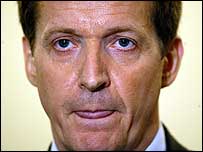Thursday, 25 December 2008, 02:38 EST
Iraq's Parliament speaker resigns The Kurdish Globe
Resignation clears way for all non-U.S. troops to remain in Iraq until 2009Mahmoud al-Mashhadani, long the epicenter of arguments in legislature because of his strange behavior and abusive language, is forced to resign.
Iraqi Parliament speaker Mahmoud al-Mashhadani announced his resignation during a special Parliament session on Tuesday, said Firyad Rwandizi, spokesman for the Kurdistan Coalition bloc in Parliament.
"The [Sunni] Accordance Front List, which holds the Parliament speaker post, has to announce its candidate to fill the position in the coming days," added Rwandizi. He pointed out that the new speaker should win Parliament approval.
The resignation followed days of tension inside Parliament over the speaker's behavior. Major parliamentary blocs, including the Shiite United Iraqi Alliance, with 83 seats, and the Kurdistan Coalition list, with 53 seats, and even members of his own bloc, the Accordance Front List, demanded al-Mashhadani either resign or be dismissed.
The tension over the speaker's behavior peaked after a verbal argument between him and members of the parliamentary committee about security, defense, and the legal committee during a session on December 17, which was supposed to discuss a project law about the withdrawal of the non-American multinational forces from Iraq. After the argument, the speaker warned he would resign. And he was forced to keep his word.
"I do believe that I was faithful in doing good work," al-Mashhadani said in his address to Parliament. "If I caused hurt to you, I ask your forgiveness."
Lawmakers applauded his announcement and quickly approved the resignation with the majority of votes. The decision should pass the approval of the Republic President Board.
Earlier on Tuesday, Mahmud Osman from the Kurdistan List announced that members of his list would not attend the sessions run by al-Mashhdani, repeating his List's demands that the speaker be dismissed. "His existence halts the work of Parliament," Osman noted.
Al-Mashhdani is a leader of the National Dialogue Council Party, led by Sheikh Khalaf Al-Aliyan. His party is one of the three components of the Sunni bloc of the Accordance Front List along with the Iraqi Islamic Party led by vice president Tariq Al-Hashimi and the Iraqi People Congress Party led by member Adnan Al-Dulemi. The Accordance Front holds 23 of Parliament's 275 seats.
Acting speaker passes bill into law After al-Mashhdani's departure, the first deputy speaker, Sheikh Khalid al-Attiya, took the position of leading Parliament; he then called for a vote on a bill authorizing the presence of foreign forces for several months after a UN mandate expires by the end of the year. Parliament voted in favor of the bill.
"We authorize the government to take all necessary steps regarding foreign forces other than U.S. forces," said acting speaker al-Attiya. He said the measure approved would allow the troops to stay in Iraq through the end of July 2009.
Passage of this law follows Parliament's approval of an agreement between Baghdad and Washington to keep U.S. forces till the end of 2011.
The remaining foreign forces in Iraq include troops from Australia, El Salvador, Estonia, and Romania, as well as Britain with 4,000 soldiers in the southern province of Basra. Britain will withdraw all of their remaining troops by next May.
http://www.kurdishglobe.net/displayArticle.jsp?
id=485F1F3C01CFC84C5121C25ABC460F79




















